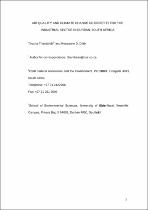 ResearchSpace
ResearchSpace
Air quality and climate change co-benefits for the industrial sector in Durban, South Africa
JavaScript is disabled for your browser. Some features of this site may not work without it.
- ResearchSpace
- →
- Research Publications/Outputs
- →
- Journal Articles
- →
- View Item
| dc.contributor.author |
Thambiran, Tirusha

|
|
| dc.contributor.author |
Diab, RD

|
|
| dc.date.accessioned | 2011-10-24T10:20:07Z | |
| dc.date.available | 2011-10-24T10:20:07Z | |
| dc.date.issued | 2011-10 | |
| dc.identifier.citation | Thambiran, T. and Diab, R.D. 2011. Air quality and climate change co-benefits for the industrial sector in Durban, South Africa. Energy Policy, Vol 39(10), pp 6658-6666 | en_US |
| dc.identifier.issn | 0301-4215 | |
| dc.identifier.uri | http://ideas.repec.org/a/eee/enepol/v39y2011i10p6658-6666.html | |
| dc.identifier.uri | http://hdl.handle.net/10204/5256 | |
| dc.description | This is the author’s version of a work that was accepted for publication in Energy Policy. Changes resulting from the publishing process, such as peer review, editing, corrections, structural formatting, and other quality control mechanisms may not be reflected in this document. Changes may have been made to this work since it was submitted for publication. A definitive version was subsequently published in Energy Policy, Vol 39(10), pp 6658-6666 | en_US |
| dc.description.abstract | Industries in Durban, South Africa, are a major source of air pollutant emissions and large users of fossil fuel based energy. Durban's energy strategy prioritises energy efficiency at industries as a key action, whilst industries are also the focus of the city's air quality management plan (AQMP). In this paper, measures that have been introduced in industries in Durban to effect air quality improvements and reduce energy consumption are examined in terms of their respective impacts on greenhouse gas (GHG) and air pollutant emissions. It was found that co-benefits for GHG mitigation were achieved when petroleum refineries switched from using heavy fuel oil to refinery gas and methane rich gas. Within other industries, co-benefits for air quality stemmed from reducing fossil fuel energy consumption and the improved efficiency of combustion systems. Air quality and energy policies in the city are being executed independently, without consideration of the trade-offs or synergies of the interventions being implemented. Recommendations are made for authorities and industries to consider the co-benefits for GHG mitigation in their AQMPs and where these are not possible to consider offsetting the increased GHG emissions through improved alignment with energy strategies | en_US |
| dc.language.iso | en | en_US |
| dc.publisher | Elsevier | en_US |
| dc.relation.ispartofseries | Workflow request;7241 | |
| dc.subject | Industrial sector | en_US |
| dc.subject | Air quality management | en_US |
| dc.subject | Energy consumption | en_US |
| dc.subject | Air pollution | en_US |
| dc.subject | Durban industries | en_US |
| dc.subject | Fossil fuel energy | en_US |
| dc.subject | Pollutants | en_US |
| dc.subject | GHG emissions | en_US |
| dc.subject | Petroleum refineries | en_US |
| dc.title | Air quality and climate change co-benefits for the industrial sector in Durban, South Africa | en_US |
| dc.type | Article | en_US |
| dc.identifier.apacitation | Thambiran, T., & Diab, R. (2011). Air quality and climate change co-benefits for the industrial sector in Durban, South Africa. http://hdl.handle.net/10204/5256 | en_ZA |
| dc.identifier.chicagocitation | Thambiran, Tirusha, and RD Diab "Air quality and climate change co-benefits for the industrial sector in Durban, South Africa." (2011) http://hdl.handle.net/10204/5256 | en_ZA |
| dc.identifier.vancouvercitation | Thambiran T, Diab R. Air quality and climate change co-benefits for the industrial sector in Durban, South Africa. 2011; http://hdl.handle.net/10204/5256. | en_ZA |
| dc.identifier.ris | TY - Article AU - Thambiran, Tirusha AU - Diab, RD AB - Industries in Durban, South Africa, are a major source of air pollutant emissions and large users of fossil fuel based energy. Durban's energy strategy prioritises energy efficiency at industries as a key action, whilst industries are also the focus of the city's air quality management plan (AQMP). In this paper, measures that have been introduced in industries in Durban to effect air quality improvements and reduce energy consumption are examined in terms of their respective impacts on greenhouse gas (GHG) and air pollutant emissions. It was found that co-benefits for GHG mitigation were achieved when petroleum refineries switched from using heavy fuel oil to refinery gas and methane rich gas. Within other industries, co-benefits for air quality stemmed from reducing fossil fuel energy consumption and the improved efficiency of combustion systems. Air quality and energy policies in the city are being executed independently, without consideration of the trade-offs or synergies of the interventions being implemented. Recommendations are made for authorities and industries to consider the co-benefits for GHG mitigation in their AQMPs and where these are not possible to consider offsetting the increased GHG emissions through improved alignment with energy strategies DA - 2011-10 DB - ResearchSpace DP - CSIR KW - Industrial sector KW - Air quality management KW - Energy consumption KW - Air pollution KW - Durban industries KW - Fossil fuel energy KW - Pollutants KW - GHG emissions KW - Petroleum refineries LK - https://researchspace.csir.co.za PY - 2011 SM - 0301-4215 T1 - Air quality and climate change co-benefits for the industrial sector in Durban, South Africa TI - Air quality and climate change co-benefits for the industrial sector in Durban, South Africa UR - http://hdl.handle.net/10204/5256 ER - | en_ZA |





